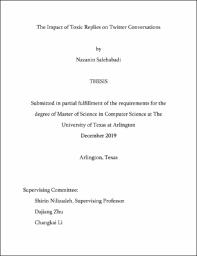
ATTENTION: The works hosted here are being migrated to a new repository that will consolidate resources, improve discoverability, and better show UTA's research impact on the global community. We will update authors as the migration progresses. Please see MavMatrix for more information.
Show simple item record
| dc.contributor.advisor | Nilizadeh, Shirin | |
| dc.creator | Salehabadi, Nazanin | |
| dc.date.accessioned | 2020-01-14T20:42:58Z | |
| dc.date.available | 2020-01-14T20:42:58Z | |
| dc.date.created | 2019-12 | |
| dc.date.issued | 2019-12-11 | |
| dc.date.submitted | December 2019 | |
| dc.identifier.uri | http://hdl.handle.net/10106/28878 | |
| dc.description.abstract | Social media has become an empowering agent for individual voices and freedom of expression. Yet, it can also serve as a breeding ground for hate speech. According to a Pew Research Center study, 41% of Americans have been personally subjected to harassing behavior online, 66% have witnessed these behaviors directed at others, and 18% have been subjected to particularly severe forms of harassment online, such as physical threats, harassment over a sustained period, sexual harassment, or stalking. Recently, many research studies have tried to understand online hate speech and its implications, focusing on detecting and characterizing hate speech. One limitation of these works is that they analyze a collection of individual messages without considering the larger conversational context. Our project has two objectives: First, we characterize the impact of hate speech on Twitter conversations, in terms of conversation length and sentiment, as well as user engagement; Second, we demonstrate the feasibility of automatically generating hate replies to some tweets, using retrieval models. For the first objective, we: (1) extracted toxic tweets and their corresponding conversations; (2) defined a toxicity trend score for conversations; and (3) studied the impact of toxic replies on twitter conversations using statistical methods. For the second objective, we: (1) created a knowledge database for toxic tweets and replies; (2) implemented a retrieval model that uses Doc2vec embedding, which identifies N top tweet-reply matches for a specific tweet; (3) proposed a ranking algorithm based on Word2vec that identifies the best hate reply for the tweet; (4) evaluated our approach by implementing some alternative approaches and running several studies on Amazon Mechanical Turk. | |
| dc.format.mimetype | application/pdf | |
| dc.subject | Toxic | |
| dc.subject | Hate speech | |
| dc.subject | Conversation study | |
| dc.subject | Twitter conversations | |
| dc.title | The Impact of Toxic Replies on Twitter Conversations | |
| dc.type | Thesis | |
| dc.degree.department | Computer Science and Engineering | |
| dc.degree.name | Master of Science in Computer Science | |
| dc.date.updated | 2020-01-14T20:42:59Z | |
| thesis.degree.department | Computer Science and Engineering | |
| thesis.degree.grantor | The University of Texas at Arlington | |
| thesis.degree.level | Masters | |
| thesis.degree.name | Master of Science in Computer Science | |
| dc.type.material | text | |
Files in this item
- Name:
- SALEHABADI-THESIS-2019.pdf
- Size:
- 1.259Mb
- Format:
- PDF
This item appears in the following Collection(s)
Show simple item record


